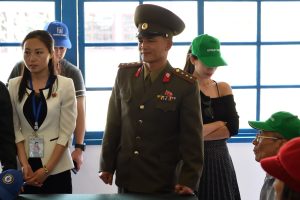According to the Koryo Tours’ website, it is now possible to book a tour of North Korea scheduled to leave this November. The re-opening of (part) of the country to tourism can be interpreted as an attempt to showcase North Korea’s image of prosperity, likely bolstered by the recent gains from the newly established military collaboration with Russia.
The resumption of tourism in the Samjiyon border region, which in recent years gained attention for its flashy construction projects, provides valuable insight into the country’s current position. The regime has poured significant resources into tourism infrastructure to project an image of progress, hoping to impress foreign visitors while trying to temporarily divert international attention from its military and nuclear ambitions.
Yet this comes at a cost to the population’s well-being, as funds are funneled away from addressing famine or improving the country’s crumbling infrastructure.
International sanctions do not currently ban tourism to North Korea, and proponents of engagement argue that exposing North Koreans to foreign visitors can have a positive impact, fostering human-to-human contact in a society otherwise mostly cut off from the outside world.
The country’s reopening to tourism could be seen as a precursor to more significant international moves. Just as tourists are being allowed back into Samjiyon, several Western embassies are also being granted permission to return.
Swedish diplomats returned to Pyongyang last week, after other traditionally “friendlier” embassies made a comeback in the country earlier this year. This might mark a first step toward North Korea’s tentative re-entry into global diplomacy.
Sweden, which has long acted as a mediator between Pyongyang and the West, could play an essential role as a bridge-builder. The simultaneous reopening of diplomatic missions suggests that North Korea might still see some value in maintaining relations with the West, despite its deepening ties with Russia.
Since early 2023, North Korea and Russia have capitalized on sanctions evasion and their isolation. This resulted in a dangerous military partnership that challenges the security of both Europe and the Indo-Pacific.
As North Korea drifts closer to Moscow, there is an urgent need for the West to counterbalance this trend by leveraging any remaining diplomatic channel.
It is unlikely that North Korea’s broader policies will shift overnight. However, the re-establishment of diplomatic relations offers the opportunity to establish a stepping stone toward future negotiations and de-escalation of regional tensions.
The last two decades of economic sanctions and isolation have not curbed North Korea’s nuclear aspirations nor prevented its alignment with other pariahs. Diplomatic channels might offer an alternative path, one that prioritizes engagement over confrontation.
While it is true that sanctions have a role to play in restraining illicit activities, such as the financing of North Korea’s nuclear program, they have not been enough to alter the regime’s course of action. Dialogue, particularly with potential mediators like Sweden, could provide the international community with a renewed opportunity to negotiate.
The upcoming U.S. elections will also factor into North Korea’s calculations: the regime might be playing it safe, keeping alive the possibility of future negotiations depending on the political climate in Washington.
Western governments should take advantage of this moment to push for the reopening of dialogue. The presence of diplomats on the ground in Pyongyang provides a direct line of communication that has sorely been missing during the pandemic years.

































